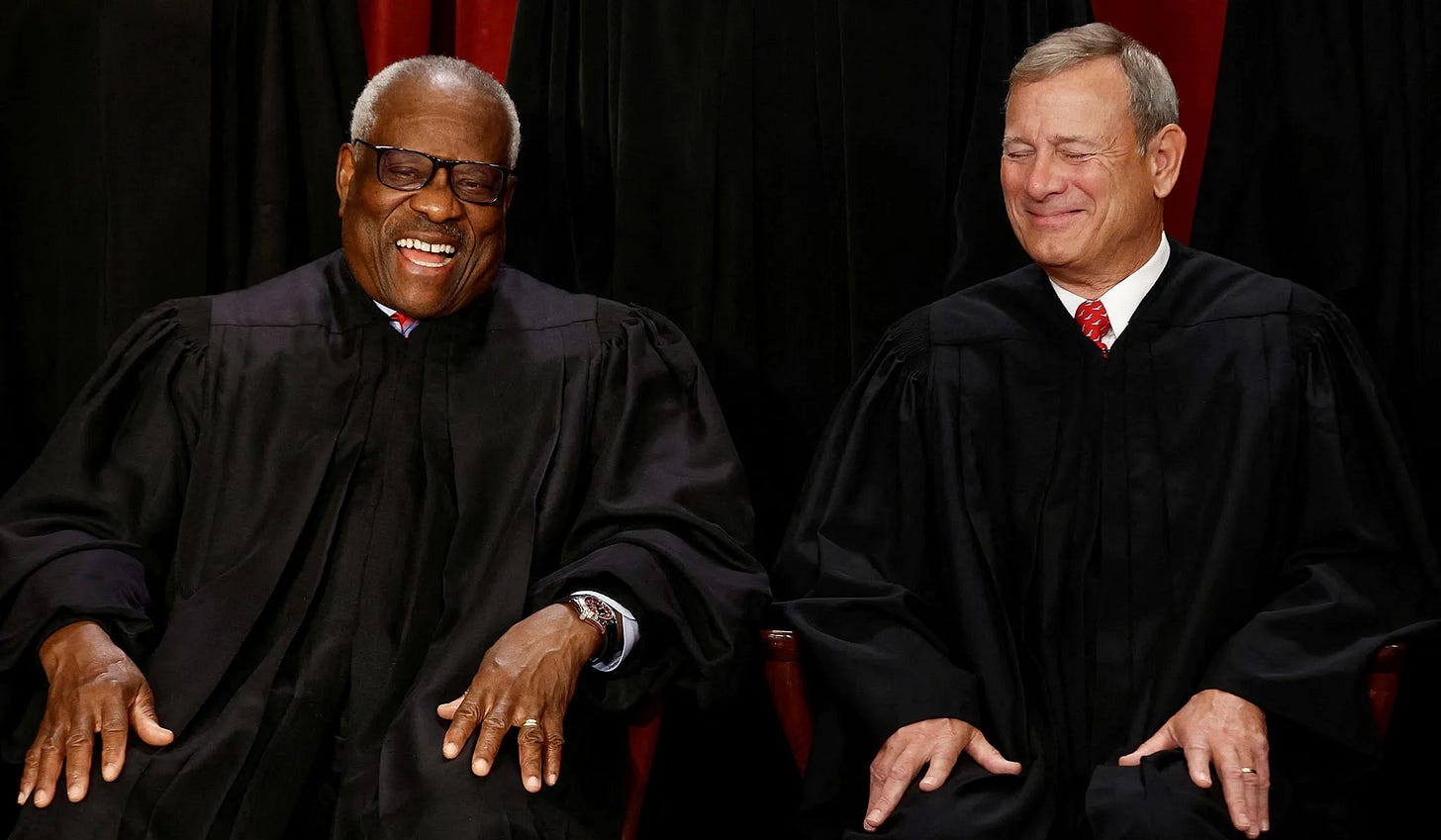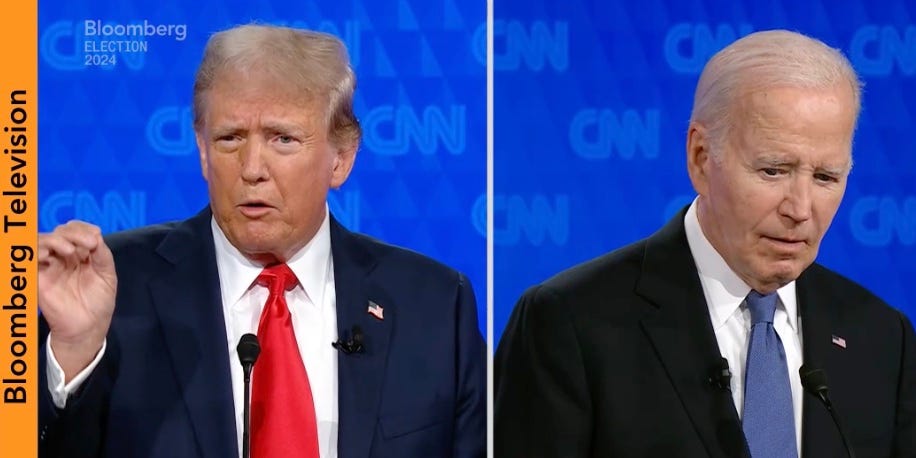After Debate Win, Pondering Trump’s First 100 Days
Kill the chicken to scare the monkey: Trump should fire heads of FBI, Fed, and military on day one
Donald Trump easily won Thursday’s debate, besting a sputtering, often-incoherent Joe Biden who had little to offer the American people but fumbled talking points and bluster. In contrast, a confident and relaxed Trump offered a way back to the Three Fat Years of economic growth and peace that punctuated his presidency while sidestepping irrelevant “gotcha” issues that matter to the political class but not to average voters.
Trump easily jumped traps that CNN’s operatives attempted to set for him. He turned a question about the January 6 riot into a comparison between America then versus America now. He flipped a gotcha question about abortion to spotlight Democrats’ advocacy for late-term abortion. Biden twice fumbled responses to this sole issue that is supposed to be Democrats’ ace up the sleeve. Trump even sounded unifying on the matter.
When goaded to say he would persecute those who have persecuted him, including Biden’s Justice Department and partisan prosecutors in New York and Atlanta, Trump admirably remarked, “My retribution is going to be success.” He transcended a stupid question about climate change to mention instead the reality that black Americans have suffered under Biden after benefitting from real wage growth under Trump.
Trump deftly turned foreign policy questions back to his many successes, including backfooting the Iranian regime that has subsequently run wild across the Middle East during the Biden administration. He also reminded voters he made Europe pay more for its own defense—a contrast to Biden’s Europe-first foreign policy where the United States must pay for the defense of Ukraine and the rest of Europe.
Beyond partisanship, Biden’s performance was personally sad. No American should want his president to look so feeble anywhere, much less with much of the country and world watching. The people who put Biden up to running again that led him to the stage on Thursday are guilty of the crime of elder abuse.
The debate’s host, political tabloid CNN, also reminded viewers why its ratings are terrible—at one point this year trailing a channel founded by late televangelists Jim and Tammy Faye Bakker that plays Westerns.
CNN’s operatives—Dana Bash and Jake Tapper—tried to help Biden and hurt Trump and Biden still failed. They downplayed the border crisis and crime wave Biden has created. They tried unsuccessfully to enmesh Trump in January 6 issues. They fretted about the progressives’ religion of climate change alarmism. They focused on what matters to CNN, not to normal people.
Their performance is the latest waypoint in the journey of presidential debates from interesting and helpful to pointless and painful TV. Bash and Tapper typified the sullen scolds of the establishment that stand in opposition to the reformer Trump. Sad, gray, dumpy, and untalented.
Nothing tonight changed the trajectory of a campaign that is pointing toward another Trump presidency. If anything, Trump’s momentum increased. Voters did not learn anything new about the two candidates with well-known and easily contrasted records as president and cognitive health.
Of course, it is too early to know for certain if Trump will get a second term. However, polls compiled at RealClearPolitics show him winning swing states and the electoral college handily and, narrowly, the popular vote as well. Without taking anything for granted, it worth discussing what will happen if Trump wins.

Specifically, how can Trump use his first 100 days to shock and awe the government and country, and begin to allay the concerns of voters who, according to RealClearPolitics, believe by 64 to 26 percent that the country is on the wrong track?
Ever since Franklin Roosevelt used the phrase “first 100 days” and called Congress into a special session in which it passed dozens of laws to mitigate the Great Depression, presidents have been judged by their first stretch in office.
Ronald Reagan had the next-most consequential beginning of his presidency, taking just over 100 days to enact tax cuts and propose government spending limitations despite the impediments of being shot and having a House of Representatives run by the other party. Reagan cut top income taxes from 70 to 50 percent (they would top out at 28 percent when he left office), which was a massive stimulus to the supply side of the economy—the productive portion not reliant on government spending.
Reagan also provided political cover to Federal Reserve Chairman Paul Volcker’s severe increases in interest rates to control high inflation. The interim result was a sharp recession, but they tamed inflation. That combined with Reagan’s freeing of the supply side of the economy allowed the private sector to begin rapid growth in time for Reagan’s landslide reelection—an expansion that outlasted Reagan’s presidency and shaped the modern economy. Reagan’s first 100-plus days had a more lasting impact on the nation than Roosevelt’s, which consisted mostly of try-anything activities to create the appearance of solving the Depression while saving capitalism politically. (More lasting Roosevelt legacies like Social Security came later.)
Trump’s first 100 days in office beginning January 20, 2017 have not inspired historians to make similar comparisons. Nonetheless, before the year was out, he had signed a significant cut not only to personal income taxes, but corporate income taxes, which had become some of the highest among advanced economies. These cuts combined with a government-wide deregulation mandate and disposal of the idea that unfair trade mislabeled as “free trade” was the key to growth all combined to create Three Fat Years of economic growth ended only by the arrival of pandemic from China.
However, Trump’s first 100 days are remembered mostly for chaos in personnel matters. If he gets a second chance, a wiser Trump should start strong with shock and awe. Americans like it when their president pretends to be a nice guy but they love it when he acts decisively and firmly. Reagan proved this when he fired illegally striking federal air traffic controllers (on day 187 of his presidency) and gained in popularity.
First, Trump should show the government bureaucracy who’s boss. There is a Chinese saying that “you kill the chicken to scare the monkey.” I’m not sure why you’d want to scare a monkey, but the federal bureaucracy certainly could use a jolt. Trump could start by firing three senior bureaucrats who supposedly are non-partisan and usually serve fixed terms, but in fact are political hacks who should be swept out like other Biden political appointees.
The first must be FBI Director Chris Wray. Trump and Congress can defer a debate on the size and power of America’s ever-burgeoning secret police apparatus until later, but firing the head of this wayward agency will send a useful message. Furthermore, FBI employees should be barred from the White House pending a review of the bureau’s future and that of the Justice Department overall.
A useful message will also ensue by firing the Chairman of the Joint Chiefs of Staff, an Air Force officer elevated by Biden and expected by the Pentagon bureaucracy to be Trump’s top military advisor at a time when a shift to traditional American maritime power is essential. Instead, Trump needs an innovative admiral as an advisor to wash the woke out of the Pentagon and reform the military.
Also on the chopping block should be Federal Reserve Chairman Jerome Powell, who helped Biden cause the largest spike in inflation in forty years as he enabled out-of-control government spending by printing money to buy government bonds. The Fed chairman is supposed to be “independent” but he isn’t. Furthermore, it is a constitutional impossibly to be independent in the executive branch and this fiction suggests that monetary policy is uniquely not subject to democracy. Trump should dismiss Powell asserting his constitutionally derived authority as president to supervise the unitary executive branch.
Second, Trump should eliminate the press corps from the White House, refuse to recognize the Republican-hating White House Correspondents’ Association, and dispense with the outdated daily briefing format that mainly entails reporters showboating. Former House Speaker Newt Gingrich and I recommended these and other steps back in 2016. Trump stuck with a traditional model that served him poorly (although Melissa McCarthy parodying Sean Spicer almost made it worth it). Today, videographers recording Trump’s reactions to questions created by AI or sent directly by the public can replace the insolent press corps. They can be moved across Pennsylvania Avenue to the New Executive Office Building for rare instances when the outdated in-person press conference model is needed. Trump can turn the press room back into the indoor pool that the March of Dimes donated to Roosevelt, which Richard Nixon later inexplicably covered up.

Third, Trump should start the phase-in of the sixty percent tariffs on China and the 10 percent overall tariff hike he has proposed. It is likely Trump would carry both houses of Congress with him in victory, but this cannot be assured. As in his first term, Trump can act on tariffs without Congress. It took the first Trump administration 26 months to emplace higher tariffs on steel and aluminum and to begin raising tariffs on a portion of Chinese imports. Even then, it took the ingenuity and sheer will of U.S. Trade Representative Bob Lighthizer fighting soft-on-China figures like Treasury Secretary Steven Mnuchin to enact the tariffs. Trump should insist the internal processes necessary for these actions be completed 100 days from his inauguration. He should request daily updates first thing when he arrives in the Oval Office at the crack of 11 am. Furthermore, Trump should raise tariffs more than 10 percent on the fancy moochers of Europe, who scorn Americans and maintain high tariffs on our cars and agriculture, despite the fact that we provide for their security—facts Trump mentioned during the debate.
Fourth, Trump should order the Border Patrol or the military if necessary to push anyone attempting to cross the border back into Mexico and begin the process of deporting all illegal aliens. Courts may delay Trump’s ability to deport all illegals, but they cannot stop him from threatening restriction or closure of the U.S.-Mexican border to trade if Mexico doesn’t start cooperating on immigration and begin eliminating its cartels. Start with a polite offer of collaborative assistance but then bring out the pain train if necessary.
Fifth, Trump should send Congress a budget with steep spending cuts that preserve the tax cuts he enacted in 2017, many of which are set to expire. The federal budget is out of control: Biden and Congress are spending $7 trillion per year, $2 trillion of which is borrowed, despite the lack of a national emergency. Debt held by the public, which excludes inter-governmental loans that will never be repaid, now amounts to $26 trillion, just short of annual national output of $28.2 trillion. We are almost as indebted as a portion of GDP as France: Biden has deprived Americans of our ancient right to make fun of the French, at least on fiscal matters. Soon, the government will spend more on interest than national defense, and interest payments may double in as few as five years.
The worst thing Trump could do aside from no cuts at all is to space cuts over the four years of his presidency. Government spending is a component of GDP (calculated as consumption + investment + government spending - trade deficit), which is why Biden has been able to avoid persistent technical recession even though Americans feel one. Government cuts spaced over time would make the economy appear lethargic—unlike the 3 percent annual growth in GDP Trump previously delivered.
Instead, Trump should rip off the band-aid: send Congress a budget for the next fiscal year by his 100th day in office that balances the budget or comes close to it. Across-the-board cuts should spare nothing, including the military, except for Social Security and Medicare. Because this is a budget action, it requires only a simple majority in the Senate to pass and cannot be filibustered. This action combined with tough monetary policy will cause a technical recession in 2026, but it will be mostly a government-spending recession, rather than one of the productive private sector. After a year of contraction, the economy will exhibit steep expansion that will again vindicate Trump’s economic and fiscal policies and set the stage for a Republican to succeed Trump. He would be repeating the Reagan-Volker playbook, which kicked off steep inflation-free expansion in 1983 that led to Reagan carrying 49 states in his 1984 reelection.
Sixth, Trump should seek a summit in his first 100 days with Russian President Vladimir Putin to begin negotiations to end the Ukraine war. Ending the killing and dropping sanctions on Russian energy is the fastest way to reduce the cost of energy for Americans until Trump can bring more U.S. energy production online. Currently Americans are paying more for oil and gas so that countries like China and India can buy steeply discounted Russian product. This is not putting America first. Putin already detailed his opening negotiating position in notional talks—a significant step. Trump should engage in direct summit diplomacy and have his national security advisor work on details, cutting the State Department out of talks and emulating how Nixon and Henry Kissinger achieved a deal to get America out of Vietnam with our prisoners of war.
Finally, Trump should nominate Supreme Court Justice Clarence Thomas to be his attorney general. The confirmation fight for attorney general will be the most brutal of a Trump II cabinet, even if Republicans end up with 53-55 Senate seats currently projected. Democrats and weaker Republicans will fret that Trump will use the Justice Department against his opponents in the same manner that Biden has, even though Trump has promised to end this abuse, repeatedly telling Fox’s Sean Hannity: “It has to stop” and saying in the debate that success will be his only revenge.

As I wrote in 2021, Thomas is America’s most dangerous black man. He remains so today for his insistence on thinking for himself, opposing DEI racism, and adhering to the Constitution. Aged 76, Thomas is likely considering retirement from the Supreme Court. Who better to take a victory lap as Attorney General and oversee badly needed reform of the Justice Department than Thomas? Democrats would make his confirmation hearing a complete hootenanny, reprising many of his written opinions in his decades on the court. While Trump’s advisors would counsel a safer, more boring nominee, a throwdown between Thomas and the Senate’s wimp-bullies is exactly what Trump should want. Thomas would prevail and gain public support just as he did in his brutal and unfair 1991 confirmation and the Senate would look like a repository of buffoons. Once confirmed, Thomas could vacate his seat on the court, allowing Trump to nominate another justice—something he did three times in his first term with excellent results.
Not since 1893 when Grover Cleveland began his second non-consecutive term as president has a chief executive begun a term that was necessarily his last (and Cleveland technically could have run again as the constitutional term limit for presidents was not ratified until 1951). Should he win, some will say Trump is a lame duck from the beginning of his second term, which generally have been lackluster since Roosevelt was president. Decisive, radical action in his first 100 days in office would refute the naysayers and buck the historical trend.







He has to bring them heal...immediately. regardless of what he says publcly
Trump should start moving much of the government out of the cesspool that is DC and spread offices across the country. Start with moving the Pentagon to Iowa, the DOJ to North Dakota, Supreme Court of Tennessee, etc.